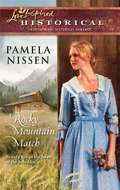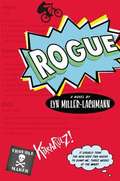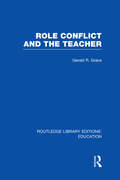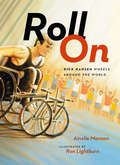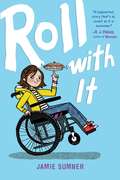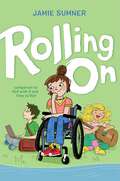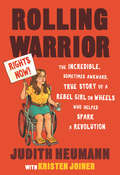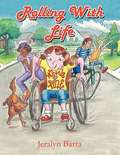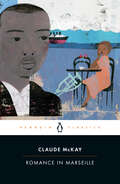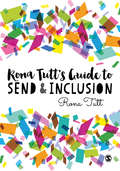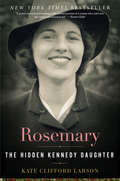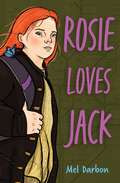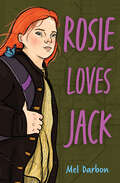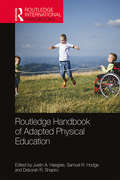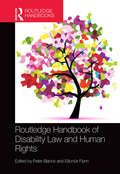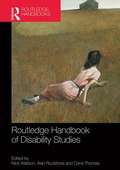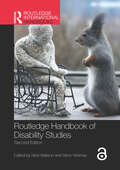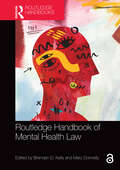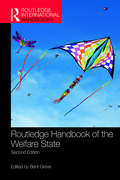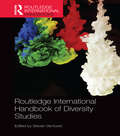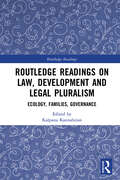- Table View
- List View
Rocky Mountain Match
by Pamela NissenWhen blindness strikes carpenter Joseph Drake, the prospect of a lifetime of darkness fills him with despair. But then his brother hires Katie Ellickson. The strong-willed, confident teacher knows what it's like to be outcast, alone--and she won't give up on Joseph, even when he's ready to give up on himself. He thinks blindness is his most difficult obstacle, until he finds a bigger challenge--trying to reach Katie's heart. Will she let him? Katie has secrets that she's carried with her to the Rocky Mountains. And there's a darkness of her own in her past, which she can't escape for long...
Rogue
by Lyn Miller-LachmannKiara has Asperger's syndrome, and it's hard for her to make friends. So whenever her world doesn't make sense--which is often--she relies on Mr. Internet for answers. But there are some questions he can't answer, like why she always gets into trouble, and how do kids with Asperger's syndrome make friends? Kiara has a difficult time with other kids. They taunt her and she fights back. Now she's been kicked out of school. She wishes she could be like her hero Rogue--a misunderstood X-Men mutant who used to hurt anyone she touched until she learned how to control her special power. When Chad moves in across the street, Kiara hopes that, for once, she'll be able to make friendship stick. When she learns his secret, she's so determined to keep Chad as a friend that she agrees not to tell. But being a true friend is more complicated than Mr. Internet could ever explain, and it might be just the thing that leads Kiara to find her own special power. In Rogue, author Lyn Miller-Lachmann celebrates everyone's ability to discover and use whatever it is that makes them different.
Role Conflict and the Teacher (Routledge Library Editions: Education)
by Gerald GraceGerald Grace here explores the concept of role conflict and the current theorizing about the problems of the teacher’s role. He investigates four potential problem areas – role diffuseness, role vulnerability, role commitment versus career orientation, and value conflict – in a sample of one hundred and fifty secondary school teachers in a Midland town. The analysis shows how a teacher’s commitment to a particular set of values exposes him or her to conflict in an achievement-oriented and pluralistic society. These conflicts, present in all schools, are seen in their clearest form among secondary modern school teachers. The author suggests that colleges of education, in emphasizing commitment and in assuming value consensus, predispose their students to conflict experiences. He indicates that internal career possibilities in schools and the influence of graduate or certified status are also important factors in conflict exposure. While accepting that certain role conflicts are important in the genesis of change, the author proposes that levels of dysfunctional conflict can be reduced by the action of head teachers, by structural change in the schools and innovations in teaching education.
Roll On
by Ainslie Manson Ron LightburnAs Rick Hansen wheels around the globe on his incredible Man in Motion World Tour, the children he meets are encouraged to dream their own dreams and work to make them come true. Readers also discover little-known facts about the great journey. They learn that Rick wheeled the equivalent of three marathons a day and went through 94 pairs of gloves. And they learn about the gift of a song that Rick and his team sang or hummed mile after mile. The lively text and enchanting illustrations combine to bring to life Rick's amazing feat and the impact it has had on children everywhere. Roll On is an inspirational story for any child who has had to overcome a disability, has a friend or sibling who lives with a disability, or who has big dreams for life.
Roll with It
by Jamie Sumner<P><P>In the tradition of Wonder and Out of My Mind, this big-hearted middle grade debut tells the story of an irrepressible girl with cerebral palsy whose life takes an unexpected turn when she moves to a new town. <P><P>Ellie’s a girl who tells it like it is. That surprises some people, who see a kid in a wheelchair and think she’s going to be all sunshine and cuddles. <P><P>The thing is, Ellie has big dreams: She might be eating Stouffer’s for dinner, but one day she’s going to be a professional baker. If she’s not writing fan letters to her favorite celebrity chefs, she’s practicing recipes on her well-meaning, if overworked, mother. But when Ellie and her mom move so they can help take care of her ailing grandpa, Ellie has to start all over again in a new town at a new school. <P><P>Except she’s not just the new kid—she’s the new kid in the wheelchair who lives in the trailer park on the wrong side of town. It all feels like one challenge too many, until Ellie starts to make her first-ever friends. Now she just has to convince her mom that this town might just be the best thing that ever happened to them!
Rolling On (Roll with It #3)
by Jamie SumnerIn this &“equal parts heartbreaking and heartwarming&” (Kirkus Reviews) companion to Jamie Sumner&’s acclaimed and beloved novels Roll with It and Time to Roll, Ellie finds herself faced with first love and learning to let go.It&’s the very end of eighth grade and all everyone can talk about is high school—everyone except Ellie Cowan. Ellie wants to freeze time. Middle school was epic. She moved to Oklahoma, made her best friends, won a baking championship, quit a beauty pageant, and dominated Putt-Putt golf in her wheelchair. But now her feelings for her best friend Bert are starting to change. When did Bert get so cute? And why are all the other girls suddenly noticing, too? As if that isn&’t enough to deal with, Grandpa&’s health takes a turn for the worse. So what do you do when you don&’t know how to hold on or when to let go?
Rolling Warrior: The Incredible, Sometimes Awkward, True Story of a Rebel Girl on Wheels Who Helped Spark a Revolution
by Judith Heumann Kristen Joiner(This is the Large Print Edition) As featured in the Oscar-nominated documentary Crip Camp, and forreaders of I Am Malala, one of the most influential disability rightsactivists in US history tells her story of fighting to belong.&“If I didn&’t fight, who would?&”Judy Heumann was only 5 years old when she was first denied her right to attend school. Paralyzed from polio and raised by her Holocaust-surviving parents in New York City, Judy had a drive for equality that was instilled early in life.In this young readers&’ edition of her acclaimed memoir, Being Heumann, Judy shares her journey of battling for equal access in an unequal world—from fighting to attend grade school after being described as a &“fire hazard&” because of her wheelchair, to suing the New York City school system for denying her a teacher&’s license because of her disability. Judy went on to lead 150 disabled people in the longest sit-in protest in US history at the San Francisco Federal Building. Cut off from the outside world, the group slept on office floors, faced down bomb threats, and risked their lives to win the world&’s attention and the first civil rights legislation for disabled people.Judy&’s bravery, persistence, and signature rebellious streak will speak to every person fighting to belong and fighting for social justice.
Rolling with Life
by Jeralyn Barta"Rolling with Life" is about a young girl, Reagan, who was born with a limiting condition, leaving her confined to a wheelchair. Reagan experiences many struggles and hardships as she rolls through life. When others realize that she is not that different, she teaches them about her life lessons, and all learn to embrace their differences with respect and acceptance of one another. It is heart-warming story about embracing our differences and learning to accept each other as we each have a special gift to share.
Romance in Marseille
by Claude McKayThe pioneering novel of physical disability, transatlantic travel, and black international politics. A vital document of black modernism and one of the earliest overtly queer fictions in the African American tradition. Published for the first time. <P><P>A Penguin Classic <P><P>Buried in the archive for almost ninety years, Claude McKay's Romance in Marseille traces the adventures of a rowdy troupe of dockworkers, prostitutes, and political organizers--collectively straight and queer, disabled and able-bodied, African, European, Caribbean, and American. Set largely in the culture-blending Vieux Port of Marseille at the height of the Jazz Age, the novel takes flight along with Lafala, an acutely disabled but abruptly wealthy West African sailor. While stowing away on a transatlantic freighter, Lafala is discovered and locked in a frigid closet. Badly frostbitten by the time the boat docks, the once-nimble dancer loses both of his lower legs, emerging from life-saving surgery as what he terms "an amputated man." Thanks to an improbably successful lawsuit against the shipping line, however, Lafala scores big in the litigious United States. Feeling flush after his legal payout, Lafala doubles back to Marseille and resumes his trans-African affair with Aslima, a Moroccan courtesan. <P><P>With its scenes of black bodies fighting for pleasure and liberty even when stolen, shipped, and sold for parts, McKay's novel explores the heritage of slavery amid an unforgiving modern economy. This first-ever edition of Romance in Marseille includes an introduction by McKay scholars Gary Edward Holcomb and William J. Maxwell that places the novel within both the "stowaway era" of black cultural politics and McKay's challenging career as a star and skeptic of the Harlem Renaissance.
Rona Tutt’s Guide to SEND & Inclusion
by Rona TuttHow to give children and young people who have SEN and disabilities (SEND), the support they need in the environment where they feel most fully included, should be a key concern of every teacher and practitioner. Drawing on her years of experience and conversations with a range of professionals, as well as the thoughts of children, young people and families who have encountered a number of settings, SEND expert Dr Rona Tutt examines both the benefits of the recent SEND reforms and also the opportunities that have been missed to meet needs more flexibly. Content focuses on: Creating a climate where all children can thrive An appreciation for the variety of innovative ways school leaders are meeting the needs of students A consideration of the wider context of SEN from local to national level Clear and accessible, this is an inspiring read for anyone concerned with how individual needs are best met, rather than where their education takes place.
Rona Tutt’s Guide to SEND & Inclusion
by Rona TuttHow to give children and young people who have SEN and disabilities (SEND), the support they need in the environment where they feel most fully included, should be a key concern of every teacher and practitioner. Drawing on her years of experience and conversations with a range of professionals, as well as the thoughts of children, young people and families who have encountered a number of settings, SEND expert Dr Rona Tutt examines both the benefits of the recent SEND reforms and also the opportunities that have been missed to meet needs more flexibly. Content focuses on: Creating a climate where all children can thrive An appreciation for the variety of innovative ways school leaders are meeting the needs of students A consideration of the wider context of SEN from local to national level Clear and accessible, this is an inspiring read for anyone concerned with how individual needs are best met, rather than where their education takes place.
Rooster
by Beth Nixon WeaverFifteen-year-old Kady Palmer is burdened with housework and caring for her senile grandmother and mentally handicapped neighbor, so when a rich, handsome boy from school becomes interested in her, she devises a plan to spend time with him.
Rosemary: The Hidden Kennedy Daughter
by Prof. Kate Clifford LarsonThey were the most prominent American family of the twentieth century. The daughter they secreted away made all the difference.<P><P> Joe and Rose Kennedy's strikingly beautiful daughter Rosemary attended exclusive schools, was presented as a debutante to the Queen of England, and traveled the world with her high-spirited sisters. And yet, Rosemary was intellectually disabled -- a secret fiercely guarded by her powerful and glamorous family. Major new sources -- Rose Kennedy's diaries and correspondence, school and doctors' letters, and exclusive family interviews -- bring Rosemary alive as a girl adored but left far behind by her competitive siblings. Kate Larson reveals both the sensitive care Rose and Joe gave to Rosemary and then -- as the family's standing reached an apex -- the often desperate and duplicitous arrangements the Kennedys made to keep her away from home as she became increasingly intractable in her early twenties. Finally, Larson illuminates Joe's decision to have Rosemary lobotomized at age twenty-three, and the family's complicity in keeping the secret. Rosemary delivers a profoundly moving coda: JFK visited Rosemary for the first time while campaigning in the Midwest; she had been living isolated in a Wisconsin institution for nearly twenty years. Only then did the siblings understand what had happened to Rosemary and bring her home for loving family visits. It was a reckoning that inspired them to direct attention to the plight of the disabled, transforming the lives of millions.
Rosie Loves Jack
by Mel DarbonSixteen-year-old Rose Tremayne, who has Down syndrome, attends a program for special-needs students in a London suburb. There she meets Jack, a young man she says "makes the sun shine in my head." Rosie and Jack are devoted to one another, but Jack, who has a traumatic brain injury, has trouble controlling his anger. After he breaks a window in an outburst he is sent to a therapy program in the town of Brighton. Rosie's father seizes the opportunity to end the relationship, but Rose takes matters into her own hands. She sets out on her own to find Jack, leading to a series of harrowing adventures that show her strength and power she never knew she possessed.
Rosie Loves Jack
by Mel DarbonRosie is a sixteen-year-old girl with Down syndrome who's fighting for little freedoms, tolerance, and love."They can't send you away. What will we do? We need us. I stop your angry, Jack. And you make me strong. You make me Rosie."Rosie loves Jack. Jack loves Rosie. So, when they're separated, Rosie will do anything to find the boy who makes the sun shine in her head. Even run away from home. Even struggle across London and travel to Brighton, though the trains are canceled, and the snow is falling. Even though some people might think a girl with Down syndrome could never survive on her own.Introducing a strong, determined, and neurodiverse teen protagonist, debut author Mel Darbon gives readers a unique character experience with a much-needed, alternative point of view. This contemporary young adult novel is a voice-driven, heartfelt story of finding your place in a world that often leaves no room for outsiders.
Routledge Handbook of Adapted Physical Education (Routledge International Handbooks)
by Samuel R. Hodge Justin A. Haegele Deborah R. ShapiroThis handbook represents the first comprehensive and evidence-based review of theory, research, and practice in the field of adapted physical education (APE). Exploring philosophical and foundational aspects of APE, the book outlines the main conceptual frameworks informing research and teaching in this area, and presents important material that will help shape best practice and future research. Written by world-leading researchers, the book introduces the key themes in APE, such as historical perspectives on disability, disability and the law, language, and measurement. It examines the most significant theoretical frameworks for understanding APE, from embodiment and social cognitive theory to occupational socialization, and surveys current debates and practical issues in APE, such as teacher training, the use of technology, and physical inactivity and health. Acknowledging the importance of the voices of children, parents and peers, the book also explores research methods and paradigms in APE, with each chapter including directions for further research. Offering an unprecedented wealth of material, the Routledge Handbook of Adapted Physical Education is an essential reference for advanced students, researchers and scholars working in APE, and useful reading for anybody with an interest in disability, physical education, sports coaching, movement science or youth sport.
Routledge Handbook of Disability Law and Human Rights
by Peter Blanck Eilionóir FlynnThis handbook provides a comprehensive and authoritative state-of-the-art review of the current and emerging research and policy on disability law. Bringing together a team of respected and experienced experts, the handbook offers a range of jurisdictional and multidisciplinary perspectives. The authors consider historical and contemporary, as well as comparative perspectives of disability law. Divided into three parts, the contributors provide a comprehensive reference to the theoretical underpinnings, ongoing debates and emerging fields within the subject. The study provides a strong basis for consideration of contemporary disability law, its research foundations, and progressive developments in the area. The book incorporates interdisciplinary and comparative country perspectives to capture the breadth of current discourse on disability law. This handbook provides a valuable resource for a wide range of scholars, public and private researchers, NGOs, and practitioners working in the area of disability law, and across national and transnational disability schemes. The work will be of important interest to those in the fields of sociology, history, psychology, economics, political science, rehabilitation sciences, medicine, technology, and law, among others.
Routledge Handbook of Disability Studies
by Carol Thomas Alan Roulstone Nick WatsonThe Routledge Handbook of Disability Studies takes a multidisciplinary approach to disability and provides an authoritative and up-to-date overview of the main issues in the field around the world today. Adopting an international perspective and consisting entirely of newly commissioned chapters arranged thematically, it surveys the state of the discipline, examining emerging and cutting edge areas as well as core areas of contention. Divided in five sections, this comprehensive handbook covers: different models and approaches to disability how key impairment groups have engaged with disability studies and the writings within the discipline policy and legislation responses to disability studies and to disability activism disability studies and its interaction with other disciplines, such as history, philosophy and science and technology studies disability studies and different life experiences, examining how disability and disability studies intersects with ethnicity, sexuality, gender, childhood and ageing. Containing chapters from an international selection of leading scholars, this authoritative handbook is an invaluable reference for all academics, researchers and more advanced students in disability studies and associated disciplines such as sociology, health studies and social work.
Routledge Handbook of Disability Studies
by Nick Watson Simo VehmasThis fully revised and expanded second edition of the Routledge Handbook of Disability Studies takes a multidisciplinary approach to disability and provides an authoritative and up-to-date overview of the main issues in the field around the world today. Adopting an international perspective and arranged thematically, it surveys the state of the discipline, examining emerging and cutting-edge areas as well as core areas of contention. Divided in five parts, this comprehensive handbook covers: Different models and approaches to disability. How key impairment groups have engaged with disability studies and the writings within the discipline. Policy and legislation responses to disability studies and to disability activism. Disability studies and its interaction with other disciplines, such as history, philosophy, sport, and science and technology studies. Disability studies and different life experiences, examining how disability and disability studies intersects with ethnicity, sexuality, gender, childhood and ageing. Containing 15 revised chapters and 12 new chapters from an international selection of leading scholars, this authoritative handbook is an invaluable reference for all academics, researchers, and more advanced students in disability studies and associated disciplines such as sociology, health studies and social work.
Routledge Handbook of Disability Studies
by Nick Watson Simo VehmasThis fully revised and expanded second edition of the Routledge Handbook of Disability Studies takes a multidisciplinary approach to disability and provides an authoritative and up-to-date overview of the main issues in the field around the world today. Adopting an international perspective and arranged thematically, it surveys the state of the discipline, examining emerging and cutting-edge areas as well as core areas of contention.Divided in five parts, this comprehensive handbook covers: Different models and approaches to disability. How key impairment groups have engaged with disability studies and the writings within the discipline. Policy and legislation responses to disability studies and to disability activism. Disability studies and its interaction with other disciplines, such as history, philosophy, sport, and science and technology studies. Disability studies and different life experiences, examining how disability and disability studies intersects with ethnicity, sexuality, gender, childhood and ageing. Containing 15 revised chapters and 12 new chapters from an international selection of leading scholars, this authoritative handbook is an invaluable reference for all academics, researchers, and more advanced students in disability studies and associated disciplines such as sociology, health studies and social work.Chapter 6 of this book is freely available as a downloadable Open Access PDF at http://www.taylorfrancis.com under a Creative Commons Attribution-Non Commercial-No Derivatives (CC-BY-NC-ND) 4.0 license.
Routledge Handbook of Mental Health Law (Routledge Handbooks in Law)
by Brendan D. Kelly and Mary DonnellyMental health law is a rapidly evolving area of practice and research, with growing global dimensions. This work reflects the increasing importance of this field, critically discussing key issues of controversy and debate, and providing up-to-date analysis of cutting-edge developments in Africa, Asia, Europe, the Americas, and Australia. This is a timely moment for this book to appear. The United Nations’ Convention on the Rights of Persons with Disabilities (2006) sought to transform the landscape in which mental health law is developed and implemented. This Convention, along with other developments, has, to varying degrees, informed sweeping legislative reforms in many countries around the world. These and other developments are discussed here. Contributors come from a wide range of countries and a variety of academic backgrounds including ethics, law, philosophy, psychiatry, and psychology. Some contributions are also informed by lived experience, whether in person or as family members. The result is a rich, polyphonic, and sometimes discordant account of what mental health law is and what it might be. The Handbook is aimed at mental health scholars and practitioners as well as students of law, human rights, disability studies, and psychiatry, and campaigners and law- and policy-makers.
Routledge Handbook of Mental Health Law (Routledge Handbooks in Law)
by Brendan D. Kelly and Mary DonnellyMental health law is a rapidly evolving area of practice and research, with growing global dimensions. This work reflects the increasing importance of this field, critically discussing key issues of controversy and debate, and providing up-to-date analysis of cutting-edge developments in Africa, Asia, Europe, the Americas, and Australia.This is a timely moment for this book to appear. The United Nations’ Convention on the Rights of Persons with Disabilities (2006) sought to transform the landscape in which mental health law is developed and implemented. This Convention, along with other developments, has, to varying degrees, informed sweeping legislative reforms in many countries around the world. These and other developments are discussed here. Contributors come from a wide range of countries and a variety of academic backgrounds including ethics, law, philosophy, psychiatry, and psychology. Some contributions are also informed by lived experience, whether in person or as family members. The result is a rich, polyphonic, and sometimes discordant account of what mental health law is and what it might be.The Handbook is aimed at mental health scholars and practitioners as well as students of law, human rights, disability studies, and psychiatry, and campaigners and law- and policy-makers.
Routledge Handbook of the Welfare State (Routledge International Handbooks)
by Bent GreveForty-five contributions from renowned international specialists in the field provide readers with expert analysis of the core issues related to the welfare state, including regional depictions of welfare states around the globe. The second edition of the Routledge Handbook of the Welfare State combines essays on methodologies, core concepts and central policy areas to produce a comprehensive understanding of what ‘the welfare state’ means around the world. In the aftermath of the credit crunch, the Handbook addresses some of the many questions about the welfare state. This second edition has been thoroughly revised and updated to include an in-depth analysis of societal changes in recent years. New articles can be found on topics such as: the impact of ideas, well-being, migration, globalisation, India, welfare typologies, homelessness and long-term care. This volume will be an invaluable reference book for students and scholars throughout the social sciences, particularly in sociology, social policy, public policy, international relations, politics and gender studies.
Routledge International Handbook of Diversity Studies (Routledge International Handbooks)
by Steven VertovecIn recent years the concept of ‘diversity’ has gained a leading place in academic thought, business practice and public policy worldwide. Although variously used, ‘diversity’ tends to refer to patterns of social difference in terms of certain key categories. Today the foremost categories shaping discourses and policies of diversity include race, ethnicity, religion, gender, disability, sexuality and age; further important notions include class, language, locality, lifestyle and legal status. The Routledge Handbook of Diversity Studies will examine a range of such concepts along with historical and contemporary cases concerning social and political dynamics surrounding them. With contributions by experts spanning Sociology, Anthropology, Political Science, History and Geography, the Handbook will be a key resource for students, social scientists and professionals. It will represent a landmark volume within a field that has become, and will continue to be, one of the most significant global topics of concern throughout the twenty-first century.
Routledge Readings on Law, Development and Legal Pluralism: Ecology, Families, Governance (Routledge Readings)
by Kalpana KannabiranRoutledge Readings on Law, Development and Legal Pluralism presents some of the finest essays on social justice, environment, rights and governance. With a lucid new Introduction, it covers a vast range of issues and offers a compelling guide to understanding the harm and risk relating to biodiversity, agro-ecology, disaster, and forest rights. The book covers critical themes such as ecology, families and governance and establishes the trajectory of contemporary ecology and law in South Asia. The thirteen chapters in the volume, divided into three sections, trace violence and marginality in the plurality of families and their laws in India, as well as discuss community-based just practices. With debates on development, governance and families, the book highlights the politics and practices of law making, law reform and law application. This multi-disciplinary volume foregrounds the politics and plural lives of/in law by including perspectives from major authors who have contributed to the academic and/or policy discourse of the subject. This book will be useful to students, scholars, policymakers, practitioners and the general reader interested in a nuanced understanding of law, especially those studying law, marginality, kinship and indigeneity studies. It will serve as essential reading for those in law, socio-legal studies, environment studies and ecology, social exclusion studies, development studies, South Asian studies, human rights, jurisprudence and constitutional studies, gender studies, history, politics, conflict and peace studies, sociology and social anthropology. It will also appeal to legal historians and practitioners of law, environmentalists, and those in public administration.
